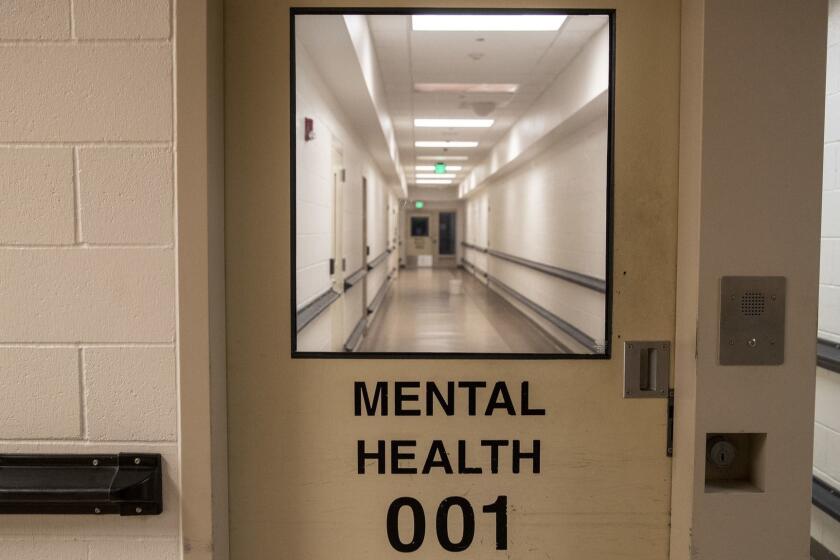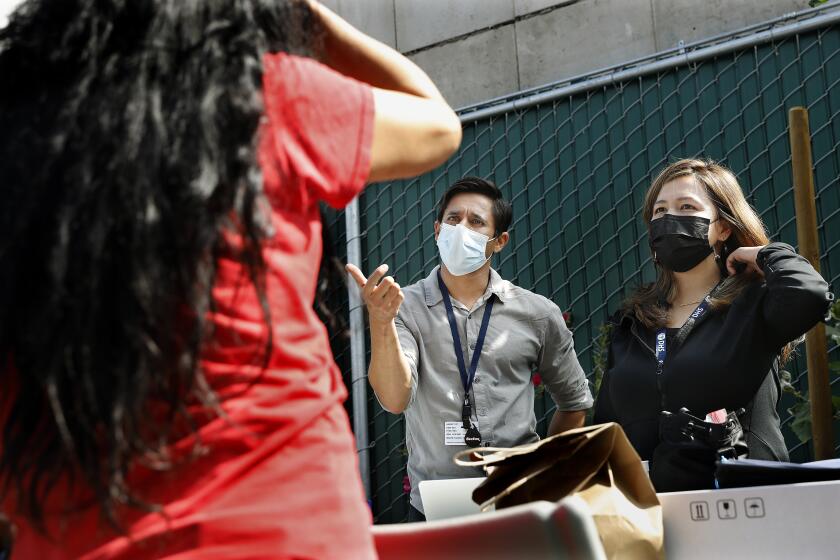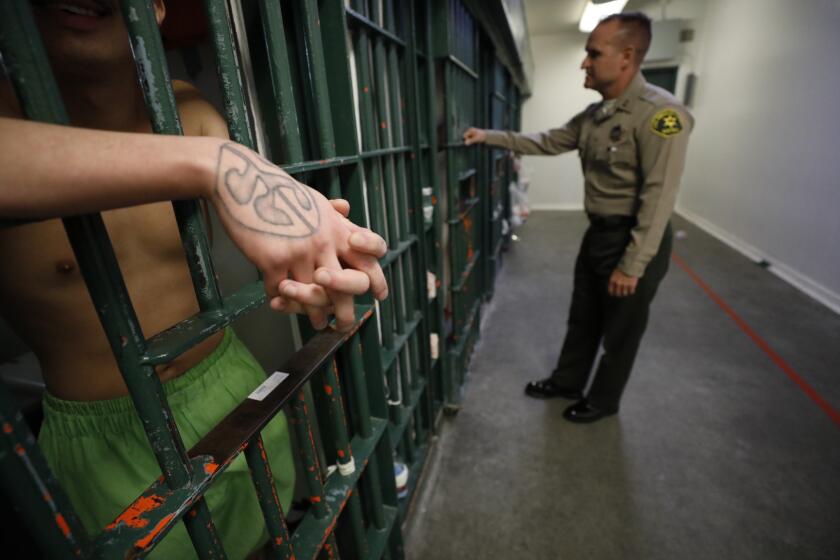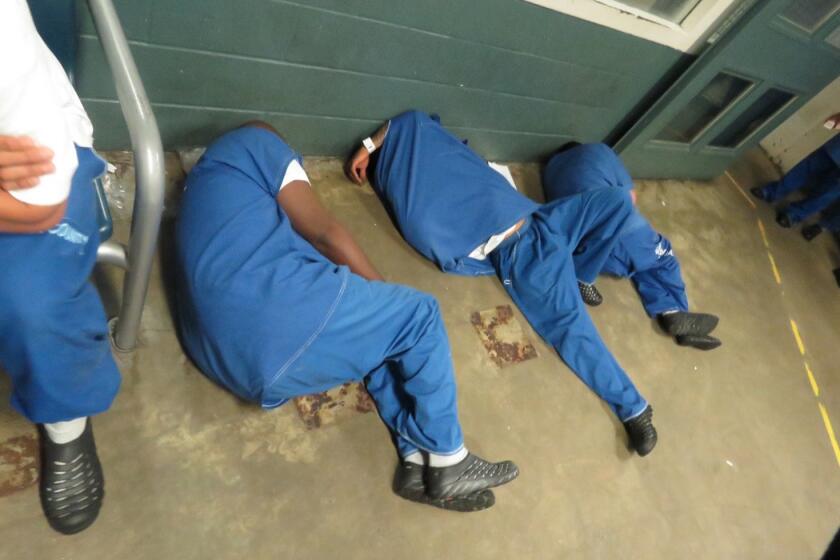Editorial: Mostly empty mental hospital can help more people — without turning into a jail

- Share via
Metropolitan State Hospital occupies 162 acres in Norwalk. That’s about the same size as Disneyland. Many of Metropolitan’s structures have been unoccupied for decades. Coyotes prowl freely across the sprawling grounds, past Tudor-style office buildings.
It is one of the few remaining California state mental hospitals that were once part of a much larger network meant to treat patients with psychiatric illnesses. Today, more than 90% of some 7,000 patients treated at the five locations at any given time (about 700 of them at Metropolitan) are in some way involved in the criminal justice system. Some are mentally incompetent to stand trial and will receive just enough care to be able to return to court to face charges. Others have been deemed not guilty by reason of insanity or have some other connection to the justice system.
Everyone agrees that Men’s Central Jail must be torn down. They should also remember why its replacement should not be another jail.
Most others who formerly would have been treated at state mental hospitals before the decades of “deinstitutionalization” beginning in the 1960s now live with their families, in private care facilities, in jail or on the streets.
Los Angeles County Supervisor Janice Hahn and state Sen. Bob Archuleta (D-Pico Rivera) want to use a portion of Metropolitan for supportive housing for people who are currently homeless and in need of psychiatric or substance use treatment. Their efforts are laudable. Such housing and treatment are badly needed.
Last week, the Legislature passed Archuleta’s Senate Bill 1336, which would allow the state to negotiate with the county to lease some buildings for interim supportive housing. We hope the governor signs it into law.
Editorial: L.A. County has been thinking big on mental health and public safety. Let’s not backslide
When states began closing mental hospitals in the second half of the last century, the plan was never to move hundreds of thousands of patients to jails, prisons or the streets.
But it is frustrating that state and county officials are still thinking too narrowly about how to put underused and vacant public facilities to better use.
For example, L.A. County supervisors are throwing up their hands over decrepit Men’s Central Jail near downtown because they supposedly have no alternative location to house and treat people accused of crimes. Yet the arrangement under discussion for using Metropolitan would exclude patients with any involvement in the criminal justice system — even though that’s exactly what the operating portion of the hospital is already used for.
This kind of thinking makes us wonder: Are state and county officials serious about treating psychiatric illness and housing homeless people or not?
The new plan for the huge Norwalk campus is the lowest of low-hanging fruit. Its many empty acres of state property have an obvious historical link to mental health treatment, at a time when counties somehow can’t figure out where to house or treat people, and Gov. Gavin Newsom is scolding them for not doing enough.
It is shocking that the state and the county did not develop this land for mental-health-oriented housing long ago — and that the state may instead use much of the property for a Highway Patrol office.
There are some disturbing parallels between this land and the Veterans Affairs campus in West Los Angeles, where for decades officials rented out space for commercial purposes. It took a lawsuit to force federal officials to house veterans on the property.
The problem for county supervisors is that the neighbors generally don’t want mentally ill people living nearby, and certainly not those who have been accused of crimes — even on properties that historically housed such people and were doing so well before communities were built up around them.
Los Angeles has a serious meth problem that affects homelessness and crime. Policymakers and medical professionals must be more open about it.
For example, when the pandemic hit, the county temporarily closed Camp Scott, a probation camp in Santa Clarita. The city sued to block the county from reopening it to house violent juvenile offenders. A settlement reached this year will likely prevent the county from ever again housing anyone in the justice system there, violent or otherwise.
Meanwhile, the supervisors beg neighbors to accept supportive housing for formerly homeless people at many locations in the county. They rarely succeed. They could push forward anyway, but they don’t want to get sued, and most of all, they don’t want to lose an election.
That’s why they are attracted to so-called solutions that experience and evidence should tell them will fail. For example, the recently resurrected idea for a large custodial psychiatric care facility for people accused of crimes, built on the footprint of Men’s Central Jail in the county sheriff jail complex near downtown, would do little to lift patients from the cycle of illness, arrest, incarceration, release and rearrest. Law enforcement approaches to mental patients undermine their recovery.
The decrepit lockup facility was to close today under Board of Supervisors’ two-year timeline, but it remains full with no end in sight.
But the only neighbors at Men’s Central are bail bond companies and jails, which unlike homeowners have no problem with another jail moving in next door. So that bad alternative becomes politically attractive.
The supervisors keep reaching for the low-hanging fruit for housing and treating the mentally ill, and that’s fine as far as it goes. Building on land already held by the county or the state, far from neighbors who might object, is a good place to start. Examples include the Hilda L. Solis Care First Village, where the county had planned to build a new jail but at Supervisor Solis’ insistence instead built a complex of interim housing and care in coordination with the Weingart Foundation. And similar projects are led by Solis at the former County General hospital, Supervisor Kathryn Barger at Olive View-UCLA Medical Center in Sylmar and Supervisor Holly Mitchell at Harbor-UCLA Medical Center.
Political cowardice has given us a half-century of increasingly inhuman incarceration conditions and has diminished safety both inside and outside Los Angeles County jails.
Or the project that could come to fruition at the state hospital in Norwalk.
But the supervisors also have to reach much higher. They have to build many small facilities on private as well as public parcels, and stand up to cities and communities that would rather lock their most troubled residents in distant locations. The supervisors have to defend against the lawsuits and not worry so much about elections.
They have to remember — and also tell their constituents — that saying no to care facilities in their “backyards” will mean increasingly having to deal with homeless, addicted, mentally ill and sometimes law-breaking neighbors in their front yards. Those even thornier problems won’t win any elections either.
More to Read
A cure for the common opinion
Get thought-provoking perspectives with our weekly newsletter.
You may occasionally receive promotional content from the Los Angeles Times.















